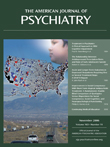Language and Addiction
To the Editor: I wish to support the editorial published by Dr. O"Brien et al. Clearly, our field of addiction medicine has been plagued by problematic language (1) . As the authors point out in their editorial, this affects the interaction between patient and clinician when dealing with pain and prescribing. However, the impact of such language on the practice of addiction medicine extends to two larger, and arguably more pervasive, issues in clinical practice.
In my experience, the use of the term “dependence” when working with patients with addiction disorders is highly problematic to the earliest stages of developing a therapeutic alliance and helping the patient gain insight into her/his disease. When patients hear this term applied to them, they often have difficulty internalizing this term as an accurate descriptor of their substance use. When asked how they themselves would define the clinical appearance of someone who is “substance dependent,” they often focus more on physical manifestations of the illness (tolerance and withdrawal). Not surprisingly then, they describe an individual who daily uses or needs the drug regularly in order to display adaptive psychosocial functioning. This observation appears most pronounced for patients in the precontemplation or contemplation stages of change. Moreover, when asked to describe someone who is “addicted” to a substance, more accurate descriptions are given, including discussions about the behavioral and psychological manifestations of the illness.
A second additional problem this term creates is that its use automatically excludes nonsubstance-related behaviors from future consideration for a diagnosis of addiction; the best example being pathological gambling disorder. The categorization of pathological gambling has been previously debated in DSM planning meetings: Is it an impulse control disorder or in the same diagnostic cluster as substance use disorders (2) ? Pathological gambling disorder has been increasingly defined by scientific and biological findings akin to substance use disorders, arguing for its diagnostic reclassification. Moreover, it has been recognized as perhaps one of the best sources of study for addiction disorders in humans because it is devoid of drug (of abuse) effects which may confound biological research findings (3) .
I support the authors’ timely discussion toward re-assessing the DSM’s language prior to its next revision. Replacing “substance use disorders” with “addiction disorders” could benefit not only the care of patients with pain, but could also enhance the patient’s understanding and acceptance of their newly diagnosed disease as well as open future options with respect to potential nondrug addictions and their classification.
1. Miller SC, Salsitz EA: Perspectives: the language of addiction. Am Soc Addict Med New 2002; 17:13Google Scholar
2. First MB: Diagnostic issues in substance use disorders—a summary. Psychiatr Res Report 2005; 21:6–8Google Scholar
3. Sumitra L, Miller SC. Pathologic gambling disorder. Postgrad Med 2005; 118:31–37Google Scholar



